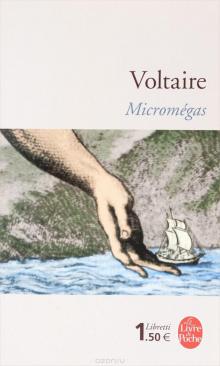Candide Read online
Page 4
—Holy Virgin! she cried. What will become of me now? A man killed in my house! If the police find out, we’re done for.
—If Pangloss had not been hanged, said Candide, he would give us good advice in this hour of need, for he was a great philosopher. Lacking him, let’s ask the old woman.
She was a sensible body, and was just starting to give her opinion of the situation, when another little door opened. It was just one o’clock in the morning, Sunday morning. This day belonged to the inquisitor. In he came, and found the whipped Candide with a sword in his hand, a corpse at his feet, Cunégonde in terror, and an old woman giving them both good advice.
Here now is what passed through Candide’s mind in this instant of time; this is how he reasoned: —If this holy man calls for help, he will certainly have me burned, and perhaps Cunégonde as well; he has already had me whipped without mercy; he is my rival; I have already killed once; why hesitate?
It was a quick, clear chain of reasoning; without giving the inquisitor time to recover from his surprise, he ran him through, and laid him beside the jew.
—Here you’ve done it again, said Cunégonde; there’s no hope for us now. We’ll be excommunicated, our last hour has come. How is it that you, who were born so gentle, could kill in two minutes a jew and a prelate?
—My dear girl, replied Candide, when a man is in love, jealous, and just whipped by the Inquisition, he is no longer himself.
The old woman now spoke up and said: —There are three Andalusian steeds27 in the stable, with their saddles and bridles; our brave Candide must get them ready: my lady has some gold coin and diamonds; let’s take to horse at once, though I can only ride on one buttock; we will go to Cadiz. The weather is as fine as can be, and it is pleasant to travel in the cool of the evening.
Promptly, Candide saddled the three horses. Cunégonde, the old woman, and he covered thirty miles without a stop. While they were fleeing, the Holy Brotherhood28 came to investigate the house; they buried the inquisitor in a fine church and threw Issachar on the dunghill.
Candide, Cunégonde, and the old woman were already in the little town of Avacena, in the middle of the Sierra Morena; and there, as they sat in a country inn, they had this conversation.
CHAPTER 10
In Deep Distress, Candide, Cunégonde, and the Old Woman Reach Cadiz; They Put to Sea
—Who then could have robbed me of my gold and diamonds? said Cunégonde, in tears. How shall we live? what shall we do? where shall I find other inquisitors and jews to give me some more?
—Ah, said the old woman, I strongly suspect that reverend Franciscan friar who shared the inn with us yesterday at Badajoz. God save me from judging him unfairly! But he came into our room twice, and he left long before us.
—Alas, said Candide, the good Pangloss often proved to me that the fruits of the earth are a common heritage of all, to which each man has equal right. On these principles, the Franciscan should at least have left us enough to finish our journey. You have nothing at all, my dear Cunégonde?
—Not a maravedi, said she.
—What to do? said Candide.
—We’ll sell one of the horses, said the old woman; I’ll ride on the croup behind my mistress, though only on one buttock, and so we will get to Cadiz.
There was in the same inn a Benedictine prior; he bought the horse cheap. Candide, Cunégonde, and the old woman passed through Lucena, Chillas, and Lebrixa, and finally reached Cadiz. There a fleet was being fitted out and an army assembled, to reason with the Jesuit fathers in Paraguay, who were accused of fomenting among their flock a revolt against the kings of Spain and Portugal near the town of St. Sacrement.29 Candide, having served in the Bulgar army, performed the Bulgar manual of arms before the general of the little army with such grace, swiftness, dexterity, fire, and agility, that they gave him a company of infantry to command. So here he is, a captain; and off he sails with Miss Cunégonde, the old woman, two valets, and the two Andalusian steeds which had belonged to My Lord the Grand Inquisitor of Portugal.
Throughout the crossing, they spent a great deal of time reasoning about the philosophy of poor Pangloss.
—We are destined, in the end, for another universe, said Candide; no doubt that is the one where everything is well. For in this one, it must be admitted, there is some reason to grieve over our physical and moral state.
—I love you with all my heart, said Cunégonde; but my soul is still harrowed by thoughts of what I have seen and suffered.
—All will be well, replied Candide; the sea of this new world is already better than those of Europe, calmer and with steadier winds. Surely it is the New World which is the best of all possible worlds.
—God grant it, said Cunégonde; but I have been so horribly unhappy in the world so far, that my heart is almost dead to hope.
—You pity yourselves, the old woman told them; but you have had no such misfortunes as mine.
Cunégonde nearly broke out laughing; she found the old woman comic in pretending to be more unhappy than she.
—Ah, you poor old thing, said she, unless you’ve been raped by two Bulgars, been stabbed twice in the belly, seen two of your castles destroyed, witnessed the murder of two of your mothers and two of your fathers, and watched two of your lovers being whipped in an auto-da-fé, I do not see how you can have had it worse than me. Besides, I was born a baroness, with seventy-two quarterings, and I have worked in a scullery.
—My lady, replied the old woman, you do not know my birth and rank; and if I showed you my rear end, you would not talk as you do, you might even speak with less assurance.
These words inspired great curiosity in Candide and Cunégonde, which the old woman satisfied with this story.
CHAPTER 11
The Old Woman’s Story
—My eyes were not always bloodshot and red-rimmed, my nose did not always touch my chin, and I was not born a servant. I am in fact the daughter of Pope Urban the Tenth and the Princess of Palestrina.30 Till the age of fourteen, I lived in a palace so splendid that all the castles of all your German barons would not have served it as a stable; a single one of my dresses was worth more than all the assembled magnificence of Westphalia. I grew in beauty, in charm, in talent, surrounded by pleasures, dignities, and glowing visions of the future. Already I was inspiring the young men to love; my breast was formed—and what a breast! white, firm, with the shape of the Venus de Medici; and what eyes! what lashes, what black brows! What fire flashed from my glances and outshone the glitter of the stars, as the local poets used to tell me! The women who helped me dress and undress fell into ecstasies, whether they looked at me from in front or behind; and all the men wanted to be in their place.
—I was engaged to the ruling prince of Massa-Carrara; and what a prince he was! as handsome as I, softness and charm compounded, brilliantly witty, and madly in love with me. I loved him in return as one loves for the first time, with a devotion approaching idolatry. The wedding preparations had been made, with a splendor and magnificence never heard of before; nothing but celebrations, masks, and comic operas, uninterruptedly; and all Italy composed in my honor sonnets of which not one was even passable. I had almost attained the very peak of bliss, when an old marquise who had been the mistress of my prince invited him to her house for a cup of chocolate. He died in less than two hours, amid horrifying convulsions. But that was only a trifle. My mother, in complete despair (though less afflicted than I), wished to escape for a while the oppressive atmosphere of grief. She owned a handsome property near Gaeta.31 We embarked on a papal galley gilded like the altar of St. Peter’s in Rome. Suddenly a pirate ship from Salé32 swept down and boarded us. Our soldiers defended themselves as papal troops usually do; falling on their knees and throwing down their arms, they begged of the corsair absolution in articulo mortis.33
—They were promptly stripped as naked as monkeys, and so was my mother, and so were our maids of honor, and so was I too. It’s a very remarkable thing, the energy these gen
tlemen put into stripping people. But what surprised me even more was that they stuck their fingers in a place where we women usually admit only a syringe. This ceremony seemed a bit odd to me, as foreign usages always do when one hasn’t traveled. They only wanted to see if we didn’t have some diamonds hidden there; and I soon learned that it’s a custom of long standing among the genteel folk who swarm the seas. I learned that my lords the very religious knights of Malta never overlook this ceremony when they capture Turks, whether male or female; it’s one of those international laws which have never been questioned.
—I won’t try to explain how painful it is for a young princess to be carried off into slavery in Morocco with her mother. You can imagine everything we had to suffer on the pirate ship. My mother was still very beautiful; our maids of honor, our mere chambermaids, were more charming than anything one could find in all Africa. As for myself, I was ravishing, I was loveliness and grace supreme, and I was a virgin. I did not remain so for long; the flower which had been kept for the handsome prince of Massa-Carrara was plucked by the corsair captain; he was an abominable negro, who thought he was doing me a great favor. My Lady the Princess of Palestrina and I must have been strong indeed to bear what we did during our journey to Morocco. But on with my story; these are such common matters that they are not worth describing.
—Morocco was knee deep in blood when we arrived. Of the fifty sons of the emperor Muley-Ismael,34 each had his faction, which produced in effect fifty civil wars, of blacks against blacks, of blacks against browns, halfbreeds against halfbreeds; throughout the length and breadth of the empire, nothing but one continual carnage.
—Scarcely had we stepped ashore, when some negroes of a faction hostile to my captor arrived to take charge of his plunder. After the diamonds and gold, we women were the most prized possessions. I was now witness of a struggle such as you never see in the temperate climate of Europe. Northern people don’t have hot blood; they don’t feel the absolute fury for women which is common in Africa. Europeans seem to have milk in their veins; it is vitriol or liquid fire that pulses through these people around Mount Atlas. The fight for possession of us raged with the fury of the lions, tigers, and poisonous vipers of that land. A Moor snatched my mother by the right arm, the first mate held her by the left; a Moorish soldier grabbed one leg, one of our pirates the other. In a moment’s time almost all our girls were being dragged four different ways. My captain held me behind him while with his scimitar he killed everyone who braved his fury. At last I saw all our Italian women, including my mother, torn to pieces, cut to bits, murdered by the monsters who were fighting over them. My captive companions, their captors, soldiers, sailors, blacks, browns, whites, mulattoes, and at last my captain, all were killed, and I remained half dead on a mountain of corpses. Similar scenes were occurring, as is well known, for more than three hundred leagues around, without anyone skimping on the five prayers a day decreed by Mohammed.
—With great pain, I untangled myself from this vast heap of bleeding bodies, and dragged myself under a great orange tree by a neighboring brook, where I collapsed, from terror, exhaustion, horror, despair, and hunger. Shortly, my weary mind surrendered to a sleep which was more of a swoon than a rest. I was in this state of weakness and languor, between life and death, when I felt myself touched by something which moved over my body. Opening my eyes, I saw a white man, rather attractive, who was groaning and saying under his breath: ‘O che sciagura d’essere senza coglioni!’35
CHAPTER 12
The Old Woman’s Story Continued
—Amazed and delighted to hear my native tongue, and no less surprised by what this man was saying, I told him that there were worse evils than those he was complaining of. In a few words, I described to him the horrors I had undergone, and then fainted again. He carried me to a nearby house, put me to bed, gave me something to eat, served me, flattered me, comforted me, told me he had never seen anyone so lovely, and added that he had never before regretted so much the loss of what nobody could give him back.
‘I was born at Naples, he told me, where they caponize two or three thousand children every year; some die of it, others acquire a voice more beautiful than any woman’s, still others go on to become governors of kingdoms.36 The operation was a great success with me, and I became court musician to the Princess of Palestrina …
‘Of my mother,’ I exclaimed.
‘Of your mother,’ cried he, bursting into tears; ‘then you must be the princess whom I raised till she was six, and who already gave promise of becoming as beautiful as you are now!’
‘I am that very princess; my mother lies dead, not a hundred yards from here, cut into quarters and buried under a pile of corpses.’
—I told him my adventures, he told me his: that he had been sent by a Christian power to the King of Morocco, to conclude a treaty granting him gunpowder, cannon, and ships with which to liquidate the traders of the other Christian powers.
‘My mission is concluded,’ said this honest eunuch; ‘I shall take ship at Ceuta and bring you back to Italy. Ma che sciagura d’essere senza coglioni!’
—I thanked him with tears of gratitude, and instead of returning me to Italy, he took me to Algiers and sold me to the dey of that country. Hardly had the sale taken place, when that plague which has made the rounds of Africa, Asia, and Europe broke out in full fury at Algiers. You have seen earthquakes; but tell me, young lady, have you ever had the plague?
—Never, replied the baroness.
—If you had had it, said the old woman, you would agree that it is far worse than an earthquake. It is very frequent in Africa, and I had it. Imagine, if you will, the situation of a pope’s daughter, fifteen years old, who in three months’ time had experienced poverty, slavery, had been raped almost every day, had seen her mother quartered, had suffered from famine and war, and who now was dying of pestilence in Algiers. As a matter of fact, I did not die; but the eunuch and the dey and nearly the entire seraglio of Algiers perished.
—When the first horrors of this ghastly plague had passed, the slaves of the dey were sold. A merchant bought me and took me to Tunis; there he sold me to another merchant, who resold me at Tripoli; from Tripoli I was sold to Alexandria, from Alexandria resold to Smyrna, from Smyrna to Constantinople. I ended by belonging to an aga of janizaries, who was shortly ordered to defend Azov against the besieging Russians.37
—The aga, who was a gallant soldier, took his whole seraglio with him, and established us in a little fort amid the Maeotian marshes,38 guarded by two black eunuchs and twenty soldiers. Our side killed a prodigious number of Russians, but they paid us back nicely. Azov was put to fire and sword without respect for age or sex; only our little fort continued to resist, and the enemy determined to starve us out. The twenty janizaries had sworn never to surrender. Reduced to the last extremities of hunger, they were forced to eat our two eunuchs, lest they violate their oaths. After several more days, they decided to eat the women too.
—We had an imam,39 very pious and sympathetic, who delivered an excellent sermon, persuading them not to kill us altogether.
‘Just cut off a single rumpsteak from each of these ladies,’ he said, ‘and you’ll have a fine meal. Then if you should need another, you can come back in a few days and have as much again; heaven will bless your charitable action, and you will be saved.’
—His eloquence was splendid, and he persuaded them. We underwent this horrible operation. The imam treated us all with the ointment that they use on newly circumcised children. We were at the point of death.
—Scarcely had the janizaries finished the meal for which we furnished the materials, when the Russians appeared in flat-bottomed boats; not a janizary escaped. The Russians paid no attention to the state we were in; but there are French physicians everywhere, and one of them, who knew his trade, took care of us. He cured us, and I shall remember all my life that when my wounds were healed, he made me a proposition. For the rest, he counselled us simply to have patien
ce, assuring us that the same thing had happened in several other sieges, and that it was according to the laws of war.
—As soon as my companions could walk, we were herded off to Moscow. In the division of booty, I fell to a boyar who made me work in his garden, and gave me twenty whiplashes a day; but when he was broken on the wheel after about two years, with thirty other boyars, over some little court intrigue,40 I seized the occasion; I ran away; I crossed all Russia; I was for a long time a chambermaid in Riga, then at Rostock, Wismar, Leipzig. Cassel, Utrecht, Leyden. The Hague, Rotterdam; I grew old in misery and shame, having only half a backside and remembering always that I was the daughter of a Pope. A hundred times I wanted to kill myself, but always I loved life more. This ridiculous weakness is perhaps one of our worst instincts; is anything more stupid than choosing to carry a burden that really one wants to cast on the ground? to hold existence in horror, and yet to cling to it? to fondle the serpent which devours us till it has eaten out our heart?
—In the countries through which I have been forced to wander, in the taverns where I have had to work, I have seen a vast number of people who hated their existence; but I never saw more than a dozen who deliberately put an end to their own misery: three negroes, four Englishmen, four Genevans, and a German professor named Robeck.41 My last post was as servant to the jew Don Issachar; he attached me to your service, my lovely one; and I attached myself to your destiny, till I have become more concerned with your fate than with my own. I would not even have mentioned my own misfortunes, if you had not irked me a bit, and if it weren’t the custom, on shipboard, to pass the time with stories. In a word, my lady, I have had some experience of the world, I know it; why not try this diversion? Ask every passenger on this ship to tell you his story, and if you find a single one who has not often cursed the day of his birth, who has not often told himself that he is the most miserable of men, then you may throw me overboard head first.

 Zadig/L'Ingénu
Zadig/L'Ingénu Candide
Candide Micromegas
Micromegas Micromegas and Other Short Fictions (Penguin ed.)
Micromegas and Other Short Fictions (Penguin ed.) Candide (Barnes & Noble Classics Series)
Candide (Barnes & Noble Classics Series) Candide (Third Edition) (Norton Critical Editions)
Candide (Third Edition) (Norton Critical Editions) Zadig or L'Ingenu
Zadig or L'Ingenu